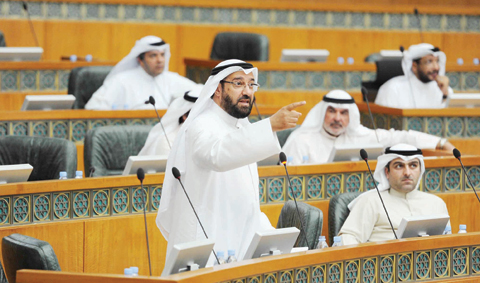 KUWAIT: Minister of Public Works Ali Al-Omair speaks during a parliamentary session at the National Assembly yesterday. - Photo by Yasser Al-Zayyat
KUWAIT: Minister of Public Works Ali Al-Omair speaks during a parliamentary session at the National Assembly yesterday. - Photo by Yasser Al-ZayyatKUWAIT: MPs yesterday strongly lashed out at ministry of public works officials and road contractors, blaming corruption and lack of supervision for the problem of flying road gravel that damaged windshields of hundreds of vehicles during the rainy season. Lawmakers, who demanded a special debate on the problem, called on Minister of Public Works Ali Al-Omair to take legal action against ministry officials and engineers who supervise road contracts and also against contractors who did not carry out the projects up to required specifications.
The issue dominated the local press coverage during the winter season when many Kuwaiti streets were found to be defected and resulted in releasing gravel that damaged the windshields of thousands of vehicles. Omair said the ministry has taken legal action against those involved by referring the issue to the public prosecution to investigate suspected corruption that led to the poor quality roads.
The minister said that the government does not have a sword to "chop off" heads and hands of officials and contractors and all it could do under the law was to refer the suspected violations to the judiciary. Several MPs however charged that certain contractors have people inside the ministry who help them and turn a blind eye to whatever they do, and demanded an investigation. Other lawmakers expected that those referred to the public prosecution will be acquitted because the referrals have legal loopholes that force the judiciary to clear them.
MP Adnan Abdulsamad claimed that the contractors' influence inside the ministry allowed some contractors to increase costs from KD 200 million to as much as KD 500 million through variation in orders. The minister said that the ministry is prepared to carry out the necessary maintenance of the affected roads, but it needs funding and as long as it does not get the budget, it will not be able to do the repairs. He said that the ministry's technical department has tested new pavement materials and was going to use it on many roads.
A ministry official told the debate that 74 percent of Kuwait's highways and 44 percent of all roads need maintenance and without financial allocations, the ministry will not be able to carry out the repairs. But at the end of the debate, there was no quorum to vote on the recommendations for the government. The Assembly decided to vote on them in the next session.
In another development, the electricity and water ministry explained yesterday that only Kuwaiti citizens residing in villas or apartments are excluded from the law to hike power and water charges. The ministry said that neither bedoons (stateless persons) nor Gulf citizens are exempted from the new charges and they have to pay like other expatriates.
The Assembly on Tuesday overwhelmingly passed the law to increase electricity and water charges, which will become effective on expats 15 months after the publication of the law in the official gazette. The increase also applies to commercial activities, industrial and agricultural sectors and government offices. For electricity, the new charges for apartments are 5 fils for the first 1,000 kilowatts, 10 fils for the second 1,000 kW and 15 fils per kilowatt for consumption above 2,000 kW. The charges are calculated on a monthly basis and therefore the bills in the summer months will be extremely high.
For water, the new prices are as follows: For the first 3,000 gallons, KD 2 per 1,000 gallons; for between 3,000 and 6,000 gallons, KD 3 per 1,000 gallons, for consumption above 6,000 gallons, KD 4 per 1,000 gallons. The current price for water is 800 fils per 1,000 gallons regardless of consumption.
By B Izzak










